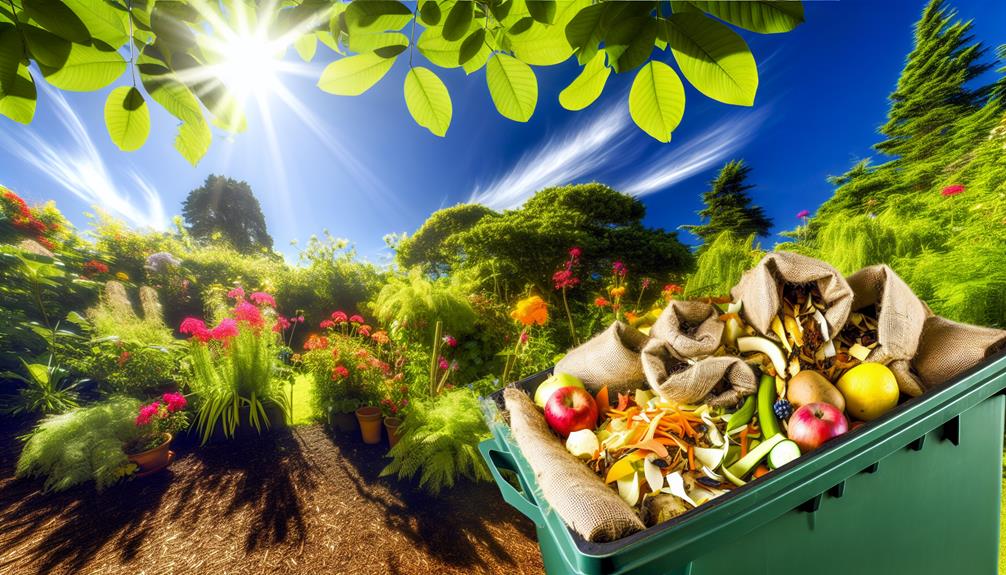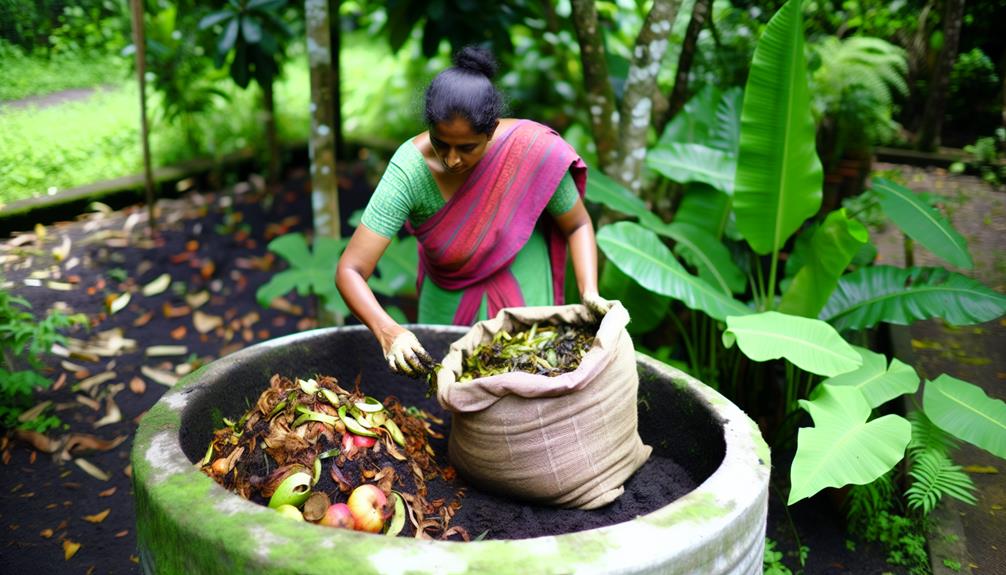

Yes, you can compost burlap, and it’s a fantastic, eco-friendly choice! Just make sure the burlap is untreated and 100% natural, often made from jute or hemp. Burlap breaks down well in a compost pile, releasing valuable nutrients that enrich your soil. For best results, cut the burlap into smaller pieces and mix it with other compost materials like vegetable scraps and dried leaves.
Keep a close watch on moisture levels to guarantee quick decomposition, which usually takes around 6 months to a year. By composting burlap, you’ll boost your garden’s health while supporting sustainable practices—exciting, right? Discover more insights for a thriving composting journey.
Given its versatility and natural appeal, let’s explore the various types of burlap available for your eco-friendly projects.
Burlap, typically made from jute, comes in different weights and weaves. Lightweight burlap is great for craft projects, allowing you to create intricate designs.
Medium-weight burlap is often used for gardening, perfect for wrapping root balls or as a weed barrier.
Heavyweight burlap is durable and ideal for more demanding tasks, like erosion control or making sturdy bags.
You’ll also find dyed burlap, which adds a splash of color to your projects, and laminated burlap, which has a plastic coating for added durability and moisture resistance.
Also Read: Can You Compost Baking Soda?
To start composting, you’ll need a mix of essential materials like greens (fruit and vegetable scraps) and browns (dead leaves and small branches), which help create the right balance for decomposition.

Understanding how organic waste breaks down will let you manage your compost pile effectively, ensuring it turns into rich, fertile soil.
Vital compost conditions, such as moisture, temperature, and aeration, are pivotal for speeding up the process and producing the best results.
Understanding the essential composting materials is crucial for creating a nutrient-rich compost pile. You’ll need a balanced mix of greens and browns.
Greens, like vegetable scraps, coffee grounds, and fresh grass clippings, provide nitrogen necessary for decomposition.
Browns, including dried leaves, straw, and cardboard, offer carbon, which helps maintain structure and airflow.
Don’t forget a little moisture—your pile should feel like a damp sponge. Layering these materials ensures a perfect blend, fostering a community of microorganisms that break everything down.
You’re not just tossing waste; you’re building an ecosystem that transforms scraps into rich, dark compost.
This shared effort can make your garden thrive, connecting you to nature and others who cherish sustainable living.
Once you’ve gathered your greens and browns, the next step is to understand how organic waste breaks down in your compost pile.
Your greens, like vegetable scraps and grass clippings, provide nitrogen, while browns, such as dried leaves and cardboard, offer carbon. Microorganisms, including bacteria and fungi, begin the decomposition process by breaking down these materials. They thrive in this mix, consuming the organic matter and turning it into rich, dark compost.
To keep the process smooth, you’ll need to balance these greens and browns, ensuring the microorganisms have what they need to work effectively.
The result is nutrient-rich compost that will nourish your plants and foster a thriving garden community, making you feel truly connected to the earth.
Creating the ideal conditions for compost involves maintaining the right balance of moisture, aeration, and temperature. Your compost pile should feel like a damp sponge—moist but not soggy.
Turn it regularly to allow air to circulate, which helps microorganisms break down materials efficiently. Temperature is essential; aim for a range between 135°F and 160°F. This heat helps kill pathogens and speeds up decomposition.
You’ll also want a good mix of green (nitrogen-rich) and brown (carbon-rich) materials to keep everything balanced. Pay attention to your compost, and it will reward you with rich, fertile soil.
Also Read: Can You Compost Ash?
Monitoring the decomposition rate of burlap in your compost pile helps you gauge its breakdown process and effectiveness. You’ll notice that burlap typically decomposes within six months to a year, depending on various factors.
To speed up this process, keep an eye on these key aspects:
When you compost burlap, you’re not just reducing waste, you’re also using a sustainable material that breaks down naturally, benefiting our planet. Its decomposition timeframe is reasonably quick, ensuring it enriches the soil without lingering too long.

Plus, as burlap decomposes, it releases nutrients that improve soil quality, supporting healthier plant growth.
Composting burlap greatly reduces landfill waste and promotes a healthier ecosystem. By choosing to compost burlap, you’re making a conscious effort to support sustainable materials that benefit the environment. Burlap, made from natural fibers like jute, is biodegradable and breaks down naturally, enriching the soil with organic matter.
By composting burlap, you help:
Your decision to compost burlap not only benefits the environment but also fosters a sense of community and collective responsibility.
The decomposition timeframe of burlap is relatively short, typically breaking down within six months to a year under ideal conditions. This quick breakdown makes burlap an excellent choice for eco-conscious gardeners like you.
By composting burlap, you contribute to reducing waste in landfills, making a positive environmental impact. Burlap decomposes faster than many synthetic materials because it’s made from jute, a natural, biodegradable fiber.
To optimize this process, make sure your compost pile has the right balance of greens and browns, proper moisture, and good aeration.
This communal effort not only enhances your garden but also fosters a sense of belonging to a community that values sustainability. Embrace burlap composting and witness a greener, healthier planet together!
Incorporating burlap into your compost can greatly improve soil quality by adding organic matter and essential nutrients. When you compost burlap, it breaks down and enriches your soil, making it healthier and more fertile. This process helps you create a robust garden ecosystem where plants can thrive.
Here’s how burlap benefits your soil:
Embrace burlap composting to nurture your garden and foster a sense of community with fellow eco-conscious gardeners!
Also Read: Can You Compost Basil?
When composting burlap, you might encounter several common pitfalls that can hinder the process.
First, not all burlap is created equal—some types are treated with chemicals or synthetic fibers that won’t break down easily. Always check the label and choose untreated, 100% natural burlap.
Another issue is cutting the burlap into smaller pieces. Large chunks take longer to decompose, so shred it to accelerate the process.
Moisture levels are critical too. If the burlap is too dry, it can slow down decomposition; if it’s too wet, it can become moldy.
Lastly, balance your compost pile by mixing burlap with a variety of green and brown materials to maintain proper nutrient ratios and avoid an imbalanced compost heap.
To sum up, composting burlap is an eco-friendly choice that helps reduce waste and enriches your soil. Remember, natural burlap decomposes faster, making it a better option for your compost pile.
Keep an eye on the decomposition process and turn your pile regularly to speed it up. By composting burlap, you’re not only contributing to a healthier environment but also nurturing your garden.
So, go ahead and start composting burlap today—your plants will thank you!
